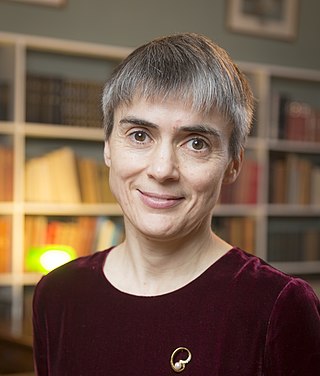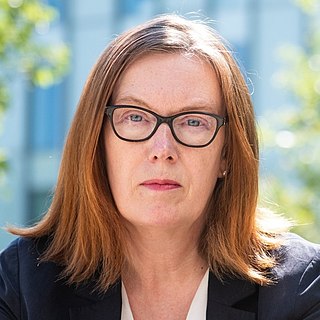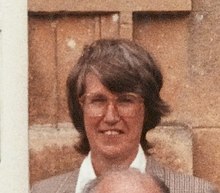Dame Margaret Kate Weston, DBE, FMA was a British museum curator who was the director of the Science Museum, London, between 1973 and 1986. She began her career as an electrical engineer before joining the Science Museum in 1955. Weston oversaw the expansion of the museum into the Science Museum Group, including the foundation of the National Railway Museum in York and the National Museum of Photography, Film and Television in Bradford. She also played a key role in acquiring Concorde 002, which is now housed at the Fleet Air Arm Museum in Yeovilton.

Dame Anne Laura Dorinthea McLaren, was a British scientist who was a leading figure in developmental biology. She paved the way for women in science and her work helped lead to human in vitro fertilisation (IVF). She left an enduring legacy marked by her research and ethical contributions to the field. She received many honors for her contributions to science, including election as fellow of the Royal Society.

Dame Kay Elizabeth Davies is a British geneticist. She is Dr Lee's Professor of Anatomy at the University of Oxford and a Fellow of Hertford College, Oxford. She is director of the Medical Research Council (MRC) functional genetics unit, a governor of the Wellcome Trust, a director of the Oxford Centre for Gene Function, and a patron and Senior Member of Oxford University Scientific Society. Her research group has an international reputation for work on Duchenne muscular dystrophy (DMD). In the 1980s, she developed a test which allowed for the screening of foetuses whose mothers have a high risk of carrying DMD.
Dame Frances Mary Ashcroft is a British ion channel physiologist. She is Royal Society GlaxoSmithKline Research Professor at the University Laboratory of Physiology at the University of Oxford. She is a fellow of Trinity College, Oxford, and is a director of the Oxford Centre for Gene Function. Her research group has an international reputation for work on insulin secretion, type II diabetes and neonatal diabetes. Her work with Andrew Hattersley has helped enable children born with diabetes to switch from insulin injections to tablet therapy.

Dame Nancy Jane Rothwell is a British physiologist. She has served as president and vice-chancellor of the University of Manchester since July 2010, having served as Deputy President and Deputy Vice-Chancellor until January 2010.

Dame Honor Bridget Fell, DBE, FRS was a British scientist and zoologist. Her contributions to science included the development of experimental methods in organ culture, tissue culture, and cell biology.
Dame Jean Olwen Thomas, is a Welsh biochemist, former Master of St Catharine's College, Cambridge, and Chancellor of Swansea University.

Dame Henrietta Miriam Ottoline Leyser is a British plant biologist and Regius Professor of Botany at the University of Cambridge, Chief Executive Officer of UK Research and Innovation (UKRI) and the Sainsbury Laboratory, Cambridge.

Dame Carol Vivien Robinson, is a British chemist and former president of the Royal Society of Chemistry (2018–2020). She was a Royal Society Research Professor and is the Dr Lee's Professor of Physical and Theoretical Chemistry, and a professorial fellow at Exeter College, University of Oxford. She is the first director of the Kavli Institution for Nanoscience Discovery, University of Oxford, and she was previously professor of mass spectrometry at the chemistry department of the University of Cambridge.

Dame Athene Margaret Donald is a British physicist. She is Professor Emerita of Experimental Physics at the University of Cambridge, and Master of Churchill College, Cambridge.

Brigitte Alice Askonas was a British immunologist and a visiting professor at Imperial College London from 1995.
Dame Margaret Elizabeth Turner-Warwick was a British medical doctor and thoracic specialist. She was the first woman president of the Royal College of Physicians (1989–1992) and, later, chairman of the Royal Devon and Exeter Health Care NHS Trust (1992–1995).

Dame Angela Ruth McLean is professor of mathematical biology in the Department of Biology, University of Oxford, and Chief Scientific Adviser to the UK Government.
John Andrew Todd FMedSci FRS is Professor of Precision Medicine at the University of Oxford, director of the Wellcome Center for Human Genetics and the JDRF/Wellcome Trust Diabetes and Inflammation Laboratory, in addition to Jeffrey Cheah Fellow in Medicine at Brasenose College. He works in collaboration with David Clayton and Linda Wicker to examine the molecular basis of type 1 diabetes.
Bryan Thomas Grenfell is a British population biologist and the Kathryn Briger and Sarah Fenton Professor of Ecology and Evolutionary Biology and Public Affairs at the Princeton School of Public and International Affairs at Princeton University.
Simon Tavaré is the founding Director of the Herbert and Florence Irving Institute of Cancer Dynamics at Columbia University. Prior to joining Columbia, he was Director of the Cancer Research UK Cambridge Institute, Professor of Cancer Research at the Department of Oncology and Professor in the Department of Applied Mathematics and Theoretical Physics (DAMTP) at the University of Cambridge.

Adrian Clive Hayday is the Kay Glendinning professor and chair in the Department of Immunobiology at King's College London and group leader at the Francis Crick Institute in the UK.

Dame Angela Rosemary Emily Strank is head of downstream technology and chief scientist of BP, responsible for technology across all the refining, petrochemicals, lubricants and fuels businesses.
Alan Frederick Cowman AC, FRS, FAA, CorrFRSE, FAAHMS, FASP, FASM is an internationally acclaimed malaria researcher whose work specialises in researching the malaria-causing parasite, Plasmodium falciparum, and the molecular mechanisms it uses to evade host responses and antimalarial drugs. He is currently deputy directory of the Walter and Eliza Hall Institute of Medical Research (WEHI) in Melbourne, and his laboratory continues to work on understanding how Plasmodium falciparum, infects humans and causes disease. He was elected as a fellow of the Royal Society in 2011 and awarded the Companion of the Order of Australia in 2019 for his "eminent service to the biological sciences, notably to molecular parasitology, to medical research and scientific education, and as a mentor."

Dame Sarah Catherine Gilbert FRS is an English vaccinologist who is a Professor of Vaccinology at the University of Oxford and co-founder of Vaccitech. She specialises in the development of vaccines against influenza and emerging viral pathogens. She led the development and testing of the universal flu vaccine, which underwent clinical trials in 2011.













